Emptied shell: Residents were evicted from the Cape York building after a fire earlier this month that claimed seven lives.
Young men push themselves up against the wall of sunlight, the galley fire fanning the warmth deeper into their chilled early-morning bones. It’s not only the cold but the distance from the heart of Egoli, where opportunity lingers around every corner, that bothers them.
For the motley crowd of 200 people banded together in a clutch of tents on the periphery of the Jo’burg central business district, the ties that bind them together are misfortune, wrong turns, ill health and, ultimately, poverty. There are no customers and no money for the sweets, airtime, loose cigarettes and drugs the young men sell. This is an encampment of the unwanted.
Last week, putting mayor Herman Mashaba’s vow to do away with hijacked buildings in Johannesburg into action, authorities went about clearing out Fattis Mansions in Jeppe Street. Two weeks before that, the Cape York building, also on Jeppe Street, caught fire — claiming seven lives.
Residents of hijacked buildings speak of a life of constant fear, where brute, brash violence holds sway and where self-declared landlords could decide the fate of their residents on a drunken whim.
Before she shared a City of Johannesburg relief tent at Wembley Stadium (in the south of the city) with six other women and a toddler, 20-year-old Nondumiso Sithole lived in a hijacked building near the Faraday taxi rank in the city centre.
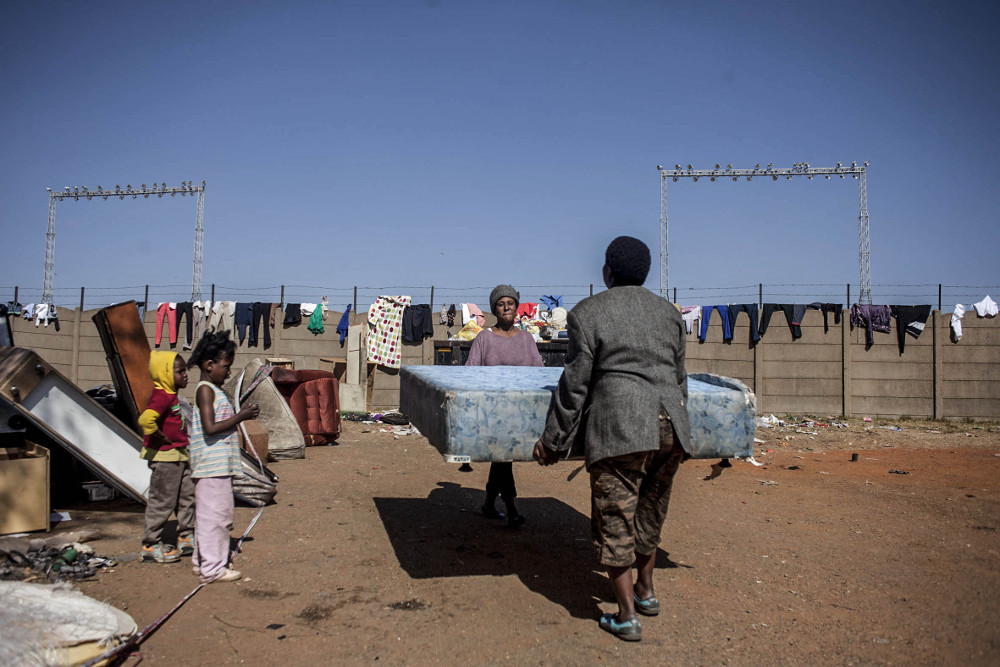
[Photo: Oupa Nkosi]
For just over a year Sithole shared a double room that was bigger than the relief tents with her two-year-old son and the boy’s father.
She never discovered who the building’s legitimate owner was but felt content that her family’s tenure and safety was secured by the building’s hijacker, a South African man they only knew as S’bu.
“Every weekend he’ll come to the door being drunk. He fights a lot, ’cos if he’s drunk he doesn’t want to listen. First he knocks, then he bangs the door and kicks it down. The place is his so we don’t talk [back],” Sithole told the Mail & Guardian this week.
Sithole moved into a room on the second floor of the two-storey building in the middle of winter in 2015, and soon discovered why S’bu was feared by the other tenants.
“It’s not a big guy. It’s a small, small boy. But nobody said anything to that guy — everyone was afraid of him because he had backup or he had people to call. Others said he had a gun. People talk; that’s why they were afraid,” she said.
On Saturday mornings S’bu would drunkenly stumble from one door to the next to collect the weekly rent — R50 a person. His henchmen, usually four or five young men, would wait on the building’s roof or break down the doors of people who refused to pay up.
“If they know you are a foreigner, they take out your things; they throw them out. Others were beaten. One day there were Zulus fighting with foreigners, Tanzanians and Mozambicans … His [S’bu’s] friends were on the roof, throwing down stones, and they were fighting outside the building. Then there were gunshots that made the foreigners run away,” Sithole, a South African citizen, said.
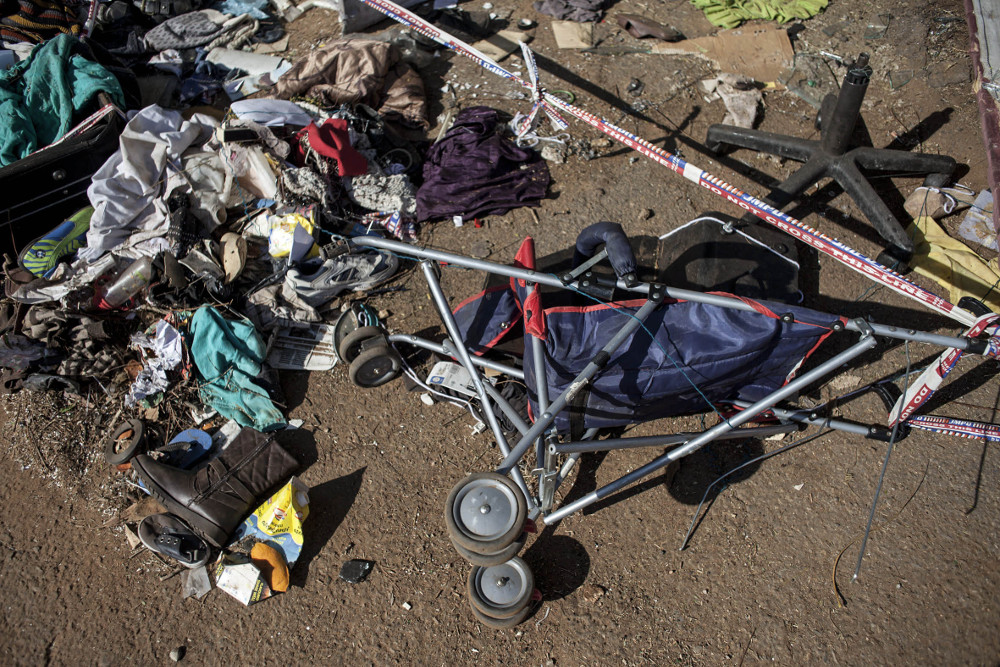
[Those forced to leave Cape York and Fattis Mansions had their possessions dumped at Wembley Stadium. Photo: Oupa Nkosi]
In the Faraday building, Sithole said, S’bu was the final arbitrator of any disputes between his tenants and took unilateral decisions about who could occupy the building. In December 2015, only a few months after moving in, Sithole witnessed what would happen to tenants who defied S’bu’s instructions.
Her neighbour, an elderly woman who had stayed in the small room next door, was evicted after failing to pay her R50 for two weeks.
“That aunty didn’t pay rent — she was my neighbour … So that day he went to her room, opened it and told her they want money. She said she didn’t have any. They took a bucket with piss and threw it on that woman’s bed. That aunty was wet from the piss,” Sithole said.
“They called some other small boys to take out everything from that aunty’s room — his friends. There was a broken lift on the roof where we used to throw our rubbish. He told them to throw her stuff down that hole,” Sithole added.
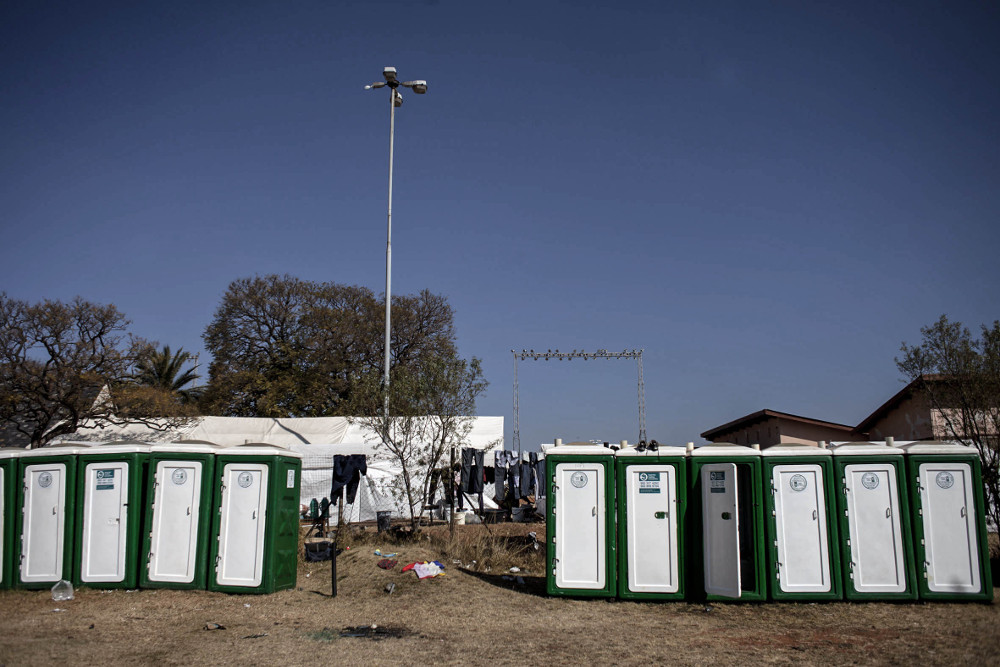
[Photo: Oupa Nkosi]
The weekly rent payment was eventually changed to R500 a month in January of 2016, after several other people were violently evicted over the December festive season, Sithole said.
In the winter of 2016, and despite being able to make a living from selling sweets and airtime at the Faraday taxi rank, the couple decided to move their family into a room with Sithole’s brother at the Cape York building on Jeppe Street.
But their time at Cape York was also short-lived. Earlier this month, a fire broke out that completely destroyed their room, their identity documents and other possessions.
Now Sithole and her boyfriend are among the group living in tents at Wembley Stadium near Rosettenville. Her child was sent to live with relatives in Alexandra.
In the tent, there are seven women, six sponge mattresses and no pillows. Each of the women has a blanket but the nights and early mornings are brutal, Sithole said.
“So we put the sponge together and sleep next to each other at night because it’s so cold.”
Despite being from South Africa, Sithole said she feels like a refugee who has been dumped in a camp, with no signs that anything will change.
“The government said they will find us a place to stay, so we are still waiting. We have no place to go, nothing to do. At least at Cape York we were getting money; even [with] R90 or R100 a day you can buy food. Now, there’s nothing; there’s no people,” she said.
Her sentiments echo those of the young men pressed up against the wall, who hail from as far away as Tanzania. Following the destruction of Cape York, where they had been living, the city brought them to Wembley, supplying them with maize, beans, vegetables and toilet rolls. The provisions lasted for 10 days.
Last week, following the eviction of mostly South Africans from the Fattis Mansions on Jeppe Street, the Gauteng provincial government delivered more tents, sponge mattresses and blankets to the Wembley temporary camp.
Beside a heap of discarded beds and cupboards that once helped to shape homes, most at the camp complain of a lack of food and water. But mostly, it’s the bitter highveld cold that dominates their thoughts.
“There are many people who are young here, but we are weak. It’s because the cold at night and in the morning hits our joints. We eat once a day at night, so we have no energy,” said 34-year-old Tanzanian Abdullah Sulieman.
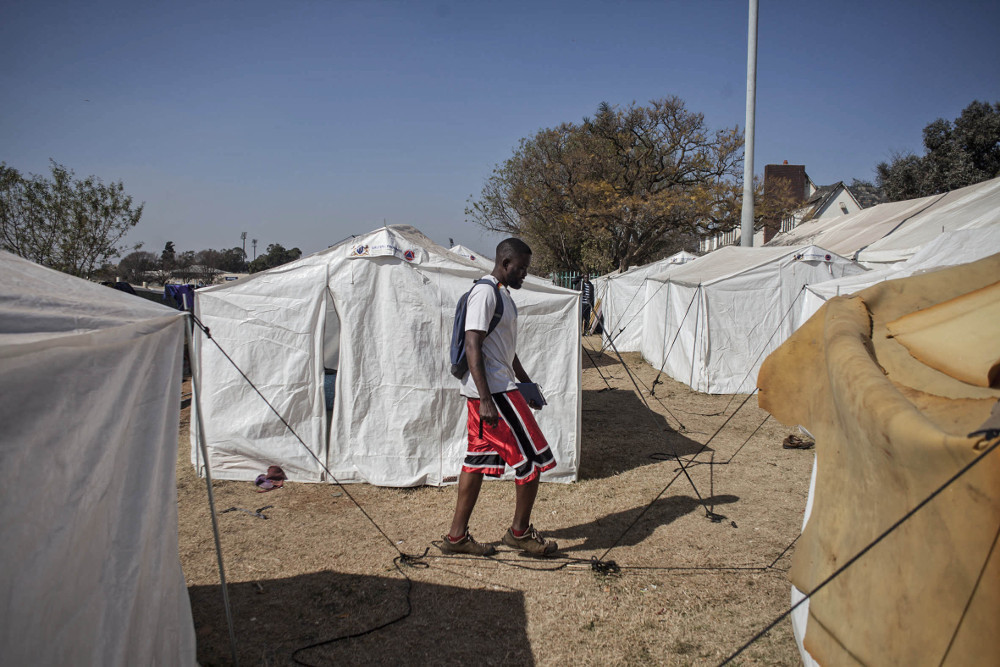
[Photo: Oupa Nkosi]
There are 24 toilets and two water tanks to service the camp.
The toilets, Sulieman said, are full within three days and the water tanks run dry before the end of each week. The sewage is collected every four days and the water tanks replenished every Monday. During the days in between, the camp residents use buckets or the field to relieve themselves, and collect water from a hosepipe that’s connected to a tap at a house next door.
The tents were set up in the yard next to the stadium because the building on the relocation site is already packed, explains Naboth Madoro from Zimbabwe, who was temporarily moved there more than a year and a half ago.
“It’s totally full inside, almost four to five people in one small room. And to make it worse, they are bringing more people,” Madoro told the M&G.
A recent court order compels the City of Johannesburg to provide alternative accommodation to anyone who is rendered homeless as a result of eviction.
With all of its temporary housing sites packed, and the high court granting more eviction orders, the tented camps have become the city’s only option.
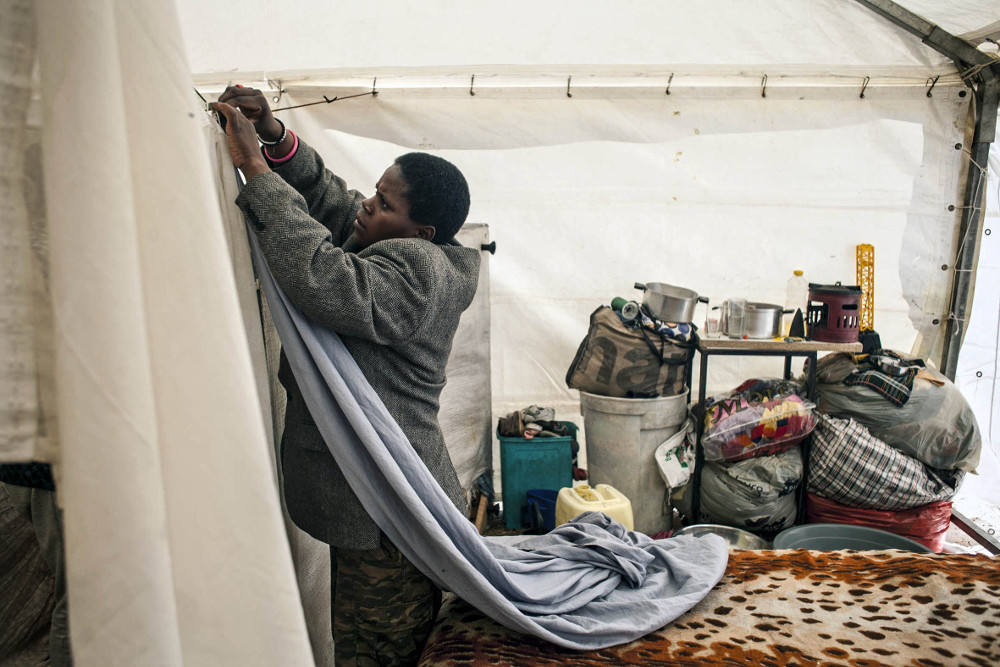
[Photo: Oupa Nkosi]
The South Africans who were moved to Wembley from Fattis Mansions last week are housed in a bigger tent. The women have attempted to create a semblance of privacy, using curtains and mattresses to create small rooms.
Twenty-six-year-old Amanda Booi was among the residents evicted from Fattis, and now shares a small tent with five women. Her desperation for privacy and relief aid has grown over the past week while she has been menstruating.
Most of Booi’s possessions were damaged or destroyed in the move and she’s now been left at the Wembley camp with only her clothes, a few appliances and official documents. Without any toiletries or pain medication, she uses toilet paper as sanitary towels and huddles between the other women as temperatures drop to two degrees in the middle of the night.
“They gave us one roll of toilet paper each when we arrived here. I use that for my period, but mine is finished so I’m using my friend’s roll,” Booi said.
Whereas Booi and Sithole hope that the government will deliver an alternative and improved place to stay, men like Rahman Maulid, without passports or customers to continue their businesses, face the prospect of a slow demise. The only option left is to risk going into the city to find another building to occupy or a way to make some money.
“You go to the city, the police stops you and asks: ‘Where’s your papers?’ You end up in jail or you can die quickly. Here, you are getting thinner every day while no one is coming to help. It’s more like a slow death,” Maulid said.